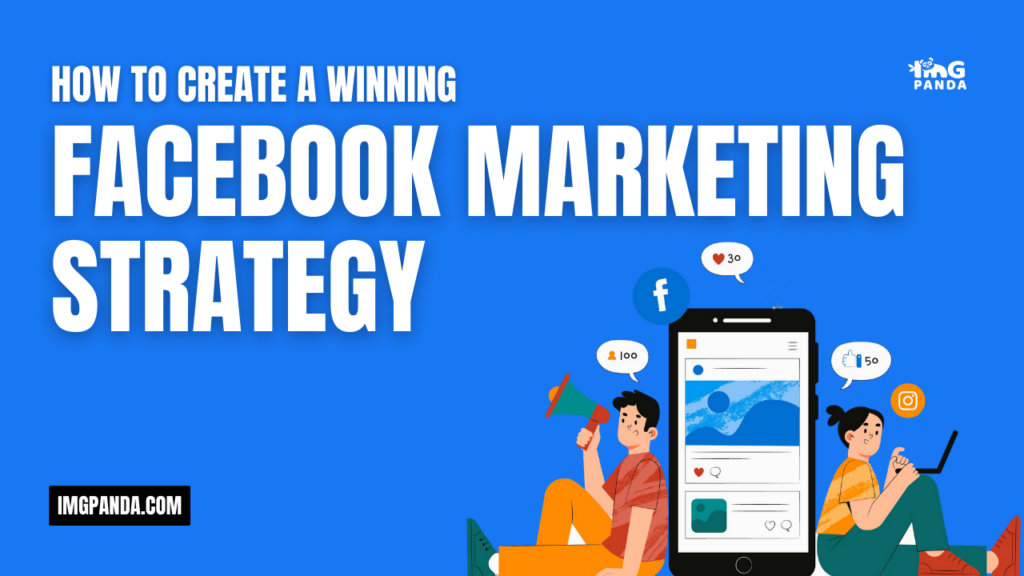Introduction
The importance of having a strong Facebook marketing strategy cannot be overstated in today's digital landscape. With over 2 billion active users on the platform, Facebook provides an unparalleled opportunity for businesses to connect with their target audience and drive sales.
A Facebook marketing strategy is a comprehensive plan that outlines how a business will leverage Facebook's features and tools to achieve its marketing goals. Whether your objective is to increase brand awareness, generate leads, or drive sales, a well-executed Facebook marketing strategy can help you achieve these goals and more.
To create a winning Facebook marketing strategy, businesses must have a clear understanding of their target audience, develop a strong brand identity, create engaging content, choose the right marketing campaigns, and regularly analyze and optimize their strategy for maximum results.
In this guide, we will provide you with a detailed overview of these key components to help you create a Facebook marketing strategy that will set you up for success. By following the tips and best practices outlined in this guide, you will be well on your way to building a thriving social media presence that drives real business results.

Also Read This: Fortiguard Downloader Labs’ Global Threat Landscape Report
Identify Your Target Audience
identifying your target audience is a crucial first step in developing a winning Facebook marketing strategy. Without a clear understanding of your ideal customer, it's nearly impossible to create content, campaigns, and messaging that resonates with them and drives engagement and conversions.
To identify your target audience on Facebook, consider the following steps:
Conduct Market Research:
Start by conducting market research to better understand your industry, competitors, and current customers. Look at demographic data such as age, gender, location, and interests to get a better sense of who your target audience might be.
Define Your Buyer Persona:
Once you have a better understanding of your industry and current customers, develop a detailed buyer persona that represents your ideal customer. A buyer persona is a fictional representation of your ideal customer, including details such as age, gender, income, education level, job title, and interests.
Leverage Facebook Insights:
Facebook provides powerful tools and insights to help you identify your target audience. Use Facebook Insights to understand the demographics of your current Facebook fans, including their age, gender, location, and interests. This data can be invaluable in creating content and campaigns that resonate with your target audience.
Conduct Surveys:
Conducting surveys can be a great way to gather feedback from your current customers and better understand their needs and preferences. Use the data you collect to create more targeted and effective Facebook marketing campaigns.
Use Lookalike Audiences:
Lookalike audiences are Facebook's powerful targeting tool that allows you to target users who are similar to your existing customer base. Use this tool to reach new users who are likely to be interested in your product or service.

Also Read This: How to Watch The Flower Bloom with English Subtitles on Dailymotion
Develop Your Brand Identity
Developing a strong brand identity is an essential component of a winning Facebook marketing strategy. Your brand identity is what sets you apart from your competitors and helps your target audience connect with your brand on an emotional level. Here are some steps to help you develop your brand identity on Facebook:
Define Your Brand:
Start by defining your brand's core values, mission, and vision. Your brand should be more than just a logo and a tagline - it should represent the unique personality, values, and beliefs of your business.
Create Consistent Visuals:
Consistent branding is key to building brand recognition and trusts with your target audience. Use consistent visuals such as color schemes, typography, and imagery across all your Facebook marketing materials, including your profile picture, cover photo, and post graphics.
Craft Your Messaging:
Your messaging should be consistent with your brand's voice and tone. Develop a clear brand voice that speaks directly to your target audience and creates an emotional connection with them. Use this voice and tone consistently across all your Facebook marketing materials, including your ad copy, social media posts, and landing pages.
Engage Your Audience:
Building a strong brand identity on Facebook requires engagement with your target audience. Encourage conversations and interactions with your followers by asking questions, responding to comments and messages, and creating content that inspires engagement.
Monitor Your Brand:
Keep a close eye on how your brand is perceived on Facebook. Monitor your brand mentions, comments, and reviews to ensure that your messaging and branding are resonating with your target audience. Use this feedback to adjust your strategy and messaging as needed.

Also Read This: Creating Your Own COD4 Server A Step-by-Step Gaming Tutorial
Create Engaging Content
Creating engaging content is a vital component of any successful Facebook marketing strategy. High-quality content is what attracts your target audience, inspires them to engage with your brand, and ultimately drives conversions. Here are some tips to help you create engaging content on Facebook:
Know Your Audience:
To create content that resonates with your target audience, you need to understand their needs, interests, and pain points. Use Facebook Insights and other analytics tools to gain insights into your audience's demographics, interests, and behavior.
Use Different Content Types:
Facebook supports a variety of content types, including text, images, videos, and live streaming. Experiment with different content formats to see what resonates with your audience. Consider using interactive content such as polls, quizzes, and surveys to encourage engagement.
Tell a Story:
Stories are a powerful way to connect with your audience emotionally and inspire engagement. Use storytelling techniques such as anecdotes, case studies, and testimonials to bring your brand to life and create an emotional connection with your audience.
Use Visuals:
Visuals such as images and videos are more engaging than plain text. Use high-quality visuals that are visually appealing, relevant to your brand, and aligned with your brand identity.
Be Authentic:
Authenticity is critical to creating engaging content on Facebook. Be transparent, honest, and authentic in your messaging and tone. Your audience will appreciate the honesty and feel more connected to your brand.
Be Consistent:
Consistency is key to building a strong brand identity and engaging your audience. Develop a content calendar and stick to a consistent posting schedule. Use consistent branding and messaging across all your Facebook marketing materials.

Also Read This: Are LinkedIn Messages Truly Private
Choose the Right Facebook Marketing Campaigns
Choosing the right Facebook marketing campaign Choosing the right Facebook marketing campaign is essential to achieving your marketing goals and driving results. Facebook offers various campaign types, each designed to achieve specific objectives. Here are some tips to help you choose the right Facebook marketing campaigns:
Determine Your Objective:
Before selecting a Facebook marketing campaign, determine your objective. Do you want to increase brand awareness, generate leads, or drive sales? Understanding your objective will help you select the right campaign type.
Know Your Audience:
Understanding your target audience is key to selecting the right Facebook marketing campaign. Use Facebook Insights and other analytics tools to understand your audience's demographics, interests, and behavior. This information will help you target your campaigns effectively.
Consider Your Budget:
Facebook offers a range of different ad formats, each with its own cost structure. Consider your budget when selecting a Facebook marketing campaign to ensure that you are getting the best return on investment.
Experiment with Different Formats:
Facebook offers a range of different ad formats, including image ads, video ads, carousel ads, and more. Experiment with different formats to see what works best for your audience.
Test and Refine:
Testing and refining your Facebook marketing campaigns is essential to achieving your marketing goals. Use A/B testing and other testing methods to refine your campaigns and improve their effectiveness over time.
Use Remarketing:
Remarketing is a powerful way to target users who have already engaged with your brand. Use Facebook's remarketing tools to target users who have visited your website, engaged with your content, or completed specific actions.
is essential to achieving your marketing goals and driving results. Facebook offers a range of different campaign types, each designed to achieve specific objectives. Here are some tips to help you choose the right Facebook marketing campaigns:
Determine Your Objective:
Before selecting a Facebook marketing campaign, determine your objective. Do you want to increase brand awareness, generate leads, or drive sales? Understanding your objective will help you select the right campaign type.
Know Your Audience:
Understanding your target audience is key to selecting the right Facebook marketing campaign. Use Facebook Insights and other analytics tools to understand your audience's demographics, interests, and behavior. This information will help you target your campaigns effectively.
Consider Your Budget:
Facebook offers a range of different ad formats, each with its own cost structure. Consider your budget when selecting a Facebook marketing campaign to ensure that you are getting the best return on investment.
Experiment with Different Formats:
Facebook offers a range of different ad formats, including image ads, video ads, carousel ads, and more. Experiment with different formats to see what works best for your audience.
Test and Refine:
Testing and refining your Facebook marketing campaigns is essential to achieving your marketing goals. Use A/B testing and other testing methods to refine your campaigns and improve their effectiveness over time.
Use Remarketing:
Remarketing is a powerful way to target users who have already engaged with your brand. Use Facebook's remarketing tools to target users who have visited your website, engaged with your content, or completed specific actions. Here are eight potent Facebook marketing strategies that businesses can put into action right now.
Also Read This: How to Start a LinkedIn Group: A Complete Guide
Analyze and Optimize Your Facebook Marketing Strategy
Analyzing and optimizing your Facebook marketing strategy is essential to achieving your marketing goals and driving results. Here are some tips to help you analyze and optimize your Facebook marketing strategy:
Set Goals:
Before analyzing and optimizing your Facebook marketing strategy, setting goals is essential. What do you want to achieve with your Facebook marketing strategy? Set specific, measurable goals that align with your business objectives.
Track Your Metrics:
Use Facebook Insights and other analytics tools to track your metrics, including reach, engagement, clicks, conversions, and more. Understanding your metrics will help you identify what's working and what's not, and make data-driven decisions about your Facebook marketing strategy.
Use A/B Testing:
A/B testing is a powerful tool for optimizing your Facebook marketing campaigns. Test different ad formats, targeting options, messaging, and more to see what resonates with your audience.
Optimize Your Budget:
Analyze your budget to ensure that you are getting the best return on investment from your Facebook marketing campaigns. Use tools such as Facebook's Ad Manager to optimize your budget and improve the effectiveness of your campaigns.
Experiment with Timing:
Experiment with different posting times to see when your audience is most active and engaged. Use this information to optimize your posting schedule and improve engagement with your content.
Stay up-to-date with Facebook's Changes:
Facebook's algorithm and advertising policies are constantly evolving. Stay up-to-date with these changes and adjust your Facebook marketing strategy accordingly to stay ahead of the curve.

Also Read This: How to Bypass Ads on Dailymotion Videos Using Tampermonkey
FAQs
Q: What is Facebook Marketing?
A: Facebook Marketing is the use of the Facebook platform to promote a business or product to a specific audience. It involves creating engaging content and targeted ads to increase brand awareness and drive conversions.
Q: Why is it important to have a Facebook marketing strategy?
A: Facebook has over 2.8 billion monthly active users, making it one of the most popular social media platforms in the world. A well-crafted Facebook marketing strategy can help businesses reach a large audience, build brand loyalty, and increase sales.
Q: What are some key components of a successful Facebook marketing strategy?
A: A successful Facebook marketing strategy should include a clear target audience, engaging content, a consistent posting schedule, and a mix of organic and paid advertising. It should also incorporate analytics and tracking to measure performance and adjust strategy as needed.
Q: How can I identify my target audience for Facebook marketing?
A: To identify your target audience, start by analyzing your existing customer base and their demographics. Use Facebook Insights to gather information on the age, gender, location, and interests of your audience. You can also conduct surveys or interviews to gather more information.
Q: What types of content should I post on my Facebook page?
A: Your content should be varied and engaging, including a mix of photos, videos, blog posts, and infographics. It should be relevant to your target audience and aligned with your brand values.
Q: How often should I post on Facebook?
A: Posting frequency depends on your specific business and audience, but generally, businesses should aim to post at least once a day to keep their audience engaged.
Q: Should I use paid advertising on Facebook?
A: Paid advertising on Facebook can be a powerful tool for reaching a larger audience and driving conversions. It is recommended to include a mix of organic and paid advertising in your Facebook marketing strategy.
Q: How can I measure the success of my Facebook marketing strategy?
A: Use Facebook Insights and other analytics tools to measure engagement rates, reach, conversions, and other key performance indicators. Use this information to adjust your strategy as needed to improve performance.
Q: What are some common mistakes to avoid in Facebook marketing?
A: Common mistakes include posting too infrequently, not targeting the right audience, focusing too much on self-promotion, and ignoring analytics and tracking data. It's important to continually evaluate your strategy and make adjustments as needed.
Conclusion
In conclusion, creating a winning Facebook marketing strategy requires a comprehensive plan that includes identifying your target audience, developing your brand identity, creating engaging content, choosing the right marketing campaigns, and regularly analyzing and optimizing your strategy. By following the tips and best practices outlined in this guide, you can create a Facebook marketing strategy that connects with your target audience, inspires engagement, and drives real business results.
Remember that creating a winning Facebook marketing strategy takes time, effort, and experimentation. Be patient and persistent in your approach, and don't be afraid to adjust your strategy based on your results. Keep up-to-date with the latest Facebook trends and best practices to stay ahead of the curve and continue driving results.
Finally, remember that building a strong social media presence on Facebook is an ongoing process. Stay engaged with your audience, create high-quality content, and regularly analyze and optimize your strategy to continue driving success. By implementing these tips and best practices, you can create a Facebook marketing strategy that sets you up for long-term success.
